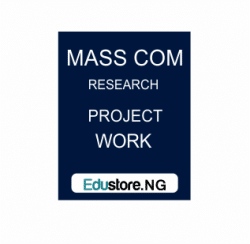A Sociological Analysis Of Coping Strategies Of Samaru Residents On Poor Water Supply
ABSTRACT
The research is an in-depth analysis on a sociological analysis of coping strategies of Samaru residents on poor water supply. The study examined the effect, consequences and ways of tackling the issue of poor water supply in the community as a whole with particular reference to examining the existing causes and effects of diseases in the society. The instrument for data collection used for this research was questionnaire. The sampling techniques used for this study was cross- sectional survey research design. One hundred and seventeen (117) respondents were randomly selected. The data collected were analysed using tables and percentages. From the analysis of the data, it was found that due to the poor water supply to the community, the residents were exposed to an outbreak of diseases and epidemics which was gotten from different sources of water which was available to them. The findings from the study necessitated certain recommendations which include the government restoring a good source of water supply such as boreholes in a situation where they are unable to fix a pipe borne water (tap water), the local authorities should work hand in hand with both the government and the community and finally the residents should engage in community service like commencing projects such as sinking of boreholes and digging of wells.
CHAPTER ONE
INTRODUCTION
1.1 Background of the Study
Water is a resource that is both valuable and vital to the existence of all living organisms, but this valued resource is increasingly being threatened as human populations grows and demand more water of high quality for domestic purposes and economic activities. Water value is linked to the provision and quality of ecosystems service. “Portable water is precious, we cannot live without it and human activities have profound impact on the quality and quantity of water supply” as pointed out by Kofi. A (Ajibade L.T, 2004. Pg 11-18).
Domestic water is used for drinking, cooking, bathing and cleaning, however, access to safe drinking and sanitation is critical in terms of health. For instance, unsafe drinking water contributed to numerous health problems in developing countries such as the one billion or more incidents of diarrhoea that occur annually (Mark et al., 2002).
The importance of water for socio-economic development is globally recognized. With increased population and rapid industrialization and the demands for water for various uses, water scarcity seems to be looming in many countries of the world. Adequate water supply is central to life, hence of the five basic human needs (water, food, health, education and security), water is the most common factor to the other four. The supply and distribution of adequately treated water and the discharge of properly treated wastewater into receiving water bodies are vital for societal wellbeing and human existence. This will help to safeguard public health by safeguarding water supplies against the transmission of diseases and the prevention of natural water sources (Akpor and Muchie, 2010).
Despite the substantial amount of money spent worldwide to provide portable water, water has still proven to be a problem in most African Countries. Water is at the core of sustainable development, from food and energy security to human and environmental health, water contributes to improvements in social wellbeing and inclusive growth, affecting the livelihoods of billions of people worldwide.
Globally, problems related to the management of water supply and distribution exists. This is partly due to extensive industrialization, increased population density and present high rate of urbanization. To tackle these problems, several legislations, guidelines and policies have been developed, both at national and international levels (Akpor and Muchie, 2010).
In Africa, the water supply situation is already precarious (Rached et al., 1996; NEPAD 2006).
DISCLAIMER:
- For Reference Only: Materials are for research, citation, and idea generation purposes and not for submission as your original final year project work.
- Avoid Plagiarism: Do not copy or submit this content as your own project. Doing so may result in academic consequences.
- Use as a Framework: This complete project research material should guide the development of your own final year project work.
- Academic Access: This platform is designed to reduce the stress of visiting school libraries by providing easy access to research materials.
- Institutional Support: Tertiary institutions encourage the review of previous academic works such as journals and theses.
- Open Education: The site is maintained through paid subscriptions to continue offering open access educational resources.





